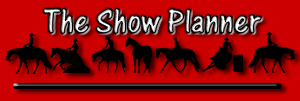 |
|
Show Horse Promotions Mary Murray
|
Making a Plan for Riding Success Laura King CHT NLP www.summitdynamics.net Step 1 is to know why you ride. Perhaps you started out in equestrian sports because you loved horses. Perhaps you took it up for exercise. Maybe it was the competition that originally attracted you. Many equestrians after riding for a while, however, lose sight of their original intent and get caught up in the negative aspects of competition. Riding is not only about winning and losing; it’s also about being in touch with yourself and finding your unique talents and abilities. Think of riding as a metaphor for empowerment, a metaphor for concentration, a metaphor for the strength we all have but don’t think we do. As soon as you find yourself losing sight of what drew you to riding in the first place, take a moment and picture how excited you were the first time you climbed up on a horse. Remember the sights, sounds, and feelings of that day, and remind yourself how excited and lucky you still are to be involved in such a rewarding activity. The first step being to decide your personal motives for riding, ask yourself these questions as often as you can: What do I want from riding? What do I want from myself when I ride? What do I want for myself? Now that you’ve reminded yourself of what you wanted from riding in the first place, the second step in your plan for success is to “draw a map” of how you plan to get back into that frame of mind so that you can enjoy your trip to success. Have you ever used Mapquest or Yahoo! Maps? If you have, you know that you can ask the program to create maps or driving directions based on shortest distance in miles, quickest route, or most scenic. For your “map,” you want to arrive at your destination (success, improvement, winning, having fun) in the easiest and most enjoyable way. Formulate a plan that you will enjoy executing on a daily and weekly basis. The enjoyment of riding is in the process of accomplishing, not in the end result itself. I’ve found throughout my life that the more I enjoy doing something, the more relaxed and confident I am, and thus the more successful I become at it. Step 3 is having a way to define and measure your success. How will you know when you’ve reached your destination? Will it be when you start to win at all of your events? When you become well or better known in your discipline? Again, try to think beyond winning and losing. In my CDs I assume that your goal in riding is to achieve peak performance, and I show you how to do this through relaxation and mental imagery exercises that target your subconscious mind. In many respects, this makes performing at your highest potential as easy and spontaneous as riding a bicycle. Just as the ability to ride a bike doesn’t require conscious thought, once the keys to relaxed riding are in your subconscious, you will never again be nervous or question your riding abilities. That being said, consider that we’ve all had days when we’ve ridden extremely well, but for some reason or another didn’t place as well as we thought we should have. Conversely, there have been days when our performance fell short of our own expectations, but we nevertheless did very well with the judges. In which scenario do you experience the most enjoyment? Keep in mind that the process of becoming a better and more successful rider is an ongoing one, and achieving peak performance simply begins with relaxing on your horse and enjoying yourself. The final step, step 4, is acknowledging your success. If your goal was to win a particular event and you failed, acknowledge the aspects of your event that were successful. Certainly the training and preparation you put into it was a success because you’ve matured and developed as a rider, ribbon or not. There might be only one first place winner, but your efforts will lead to another, perhaps bigger win. Because of all of the uncontrollable factors in riding, and because judging can by its very nature be subjective, you have little control over the results of an event. You do have complete control, however, over the effort you put in, and over what you find enjoyable about riding. Go ahead and make your own plan for success! If you have any trouble along the way, feel free to contact me for help or advice.
© 2000 - 2010 Show Horse Promotions The Show Horse Promotions web site is an informational web site, this information is subject to change without notice. Any use of, or actions taken based upon any of the information contained on this web site is done entirely at your own risk. Show Horse Promotions expressly prohibit you from republishing or redistributing this content without first receiving our written consent. By using this site, you agree not to hold us liable for any errors or delays in this content, or for any actions that you take in reliance thereon. This site contains links to other Internet sites. These links are not endorsements by us of any products or services in those sites, and we have not endorsed or approved any information in those sites. |
|
||||||||
